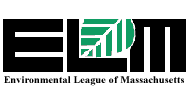| ENVIRONMENT LINKS | Massachusetts | |
|
|
|
|

|
 |
||||||
| The Executive Office of Environmental Affairs (EOEA) is the state agency primarily responsible for protecting and conserving natural resources in Massachusetts. The priorities of EOEA are: Resource Protection, Reinventing Environmental Regulation, and Developing "Green "Business. Environmental news from the Secretary's office. |
| The Environmental League
of Massachusetts is dedicated to
protecting the air, water, and land for the people of the commonwealth. It does so through public education, advocating for strong environmental laws, and ensuring that laws are implemented and enforced. The web site includes ways to get involved! |
 |
Massachusetts Department
of Environmental Protection (DEP). See especially the publications
page. Look for links to municipal assistance and brown fields, among
other interesting projects.
|
|
The Massachusetts Land Trust Coalition is an informal association of Massachusetts land trusts and conservation organizations. The site includes information about legal aspects of land protection specific to Massachusetts.
A good place to start is one's own back yard. The New
England Wild Flower Society is the oldest plant conservation organization
in the United States, promoting the conservation of temperate North American
plants through conservation, education, research, and horticulture programs.
 |
The Sierra Club is a non-profit member-supported, public interest organization that promotes conservation of the natural environment by influencing public policy decisions -- legislative, administrative, legal, and electoral. I was an active member in South Texas (where Sierra Club members were scarce!), but here I am devoting my energies elsewhere. The web site of the Massachusetts chapter is an excellent place to find information about a variety of environmental issues of state-wide concern. |
 New
England Environmental Challenges is the annual report of U.S. EPA's
Region 1 Office includes 13 stories about a variety of threats to the new
England Environment, and the steps people are taking to address them.
New
England Environmental Challenges is the annual report of U.S. EPA's
Region 1 Office includes 13 stories about a variety of threats to the new
England Environment, and the steps people are taking to address them.
The Massachusetts Toxics Use Reduction Institute (TURI) was created to promote reduction in the use of toxic chemicals and the generation of toxic by-products in industry and commerce in the State of Massachusetts.
The official website of the Commonwealth contains links to many resources at the state and local levels. Particularly useful is the reference shelf.
Broken Trust, an article on the contamination at the Massachusetts Military Reservation (Otis A.F.B.) on Cape Cod, from the Cape Cod Times. Also, see the Massachusetts DEP's Federal Facilities page, which presents the regulators' perspective on events at Otis.
Read an overview of water
resources in Massachusetts from EOEA.
| Whale Net is an interactive environmental education project sponsored by Wheelock College in Boston. |